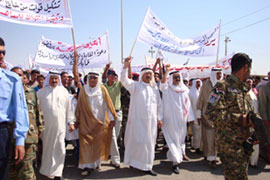Iraqi VP postpones veto decision
A second veto would send amended law back to parliament for a new round of voting.

Tariq al-Hashemi, an Iraqi vice-president and member of the presidential council, has announced that he will postpone until Sunday a decision on whether to accept or veto an amended version of the country’s election law.
“I am still looking for a political accord among all parties which allows us to move beyond this impasse,” Hashemi told a news conference. “A veto is a last resort.”
|
“The reasons why I vetoed the law still exist … I consider these reasons to be principles that I will not relinquish” Tariq al-Hashemi, Iraqi vice-president |
Hashemi vetoed an original election bill because it did not give enough seats to Iraqis who fled abroad, many of them Sunnis.
Rather than address his concerns, Iraq’s majority Shias and minority Kurds joined forces to pass an amended law that cut the number of parliamentary seats in predominantly Sunni areas.
Hashemi had 10 days from November 23 when parliament approved the amended law to veto it.
“The reasons why I vetoed the law still exist,” Hashemi said on Thursday.
“I consider these reasons to be principles that I will not relinquish because they concern all Iraqi citizens.”
Veto threat
| in depth | |||||||||||||||||
|
The High Judicial Council ruled that the deadline would be extended to Sunday, because the 10-day period would legally end on Friday, and a decision could await the subsequent working day, Abdul-Sattar Birqdar, a court spokesman said. In Iraq, the weekend is Friday and Saturday.
Last week, MPs passed an amended version of the law, which was reviewed by Iraq’s three-member presidential council, composed of Jalal Talabani, the Kurdish president, and vice presidents Adel Abdel Mehdi, a Shia Arab, and Hashemi.
Talabani and Mehdi ratified the amended election law last week.
Under the constitution, only one official from the three-member council would need to veto the bill for it to be sent back to parliament.
If a second veto is used, MPs can overturn it with a 60 per cent majority vote in parliament. An alliance of Shia and Kurdish MPs could theoretically pass that threshold with around 30 votes to spare in the 275-seat assembly.
Disputed amendments
The new version of the law does not address Hashemi’s concerns. The amendments would count the votes of Iraqis living abroad toward their home provinces, rather than allocating additional parliamentary seats representing the Iraqi diaspora, as Hashemi had requested.
| FROM THE BLOGS | |||
|
The amended law also increases the number of MPs to be elected in the northern autonomous Kurdish region after many Kurds threatened to boycott the polls if the three provinces they control were not allocated more seats.
Osama al-Nujeifi, a Sunni parliamentarian from the northern city of Mosul, said the amendment would transfer seats from northern provinces where Sunnis have a strong presence to the Kurdish-run north.
“It is a way to steal seats from Mosul and Salahuddin provinces and give them to Kurdistan provinces in an illegitimate way,” he said.
Shia-dominated provinces will also broadly have fewer seats under the new law but are likely to retain a substantial majority in parliament.
Elections in question
Hashemi’s November 18 veto started a chain of events which has put the national elections in question with the electoral commission halting its work organising the polls until the law is finalised. According to the constitution, national elections must be held before January 31.
 |
| Sunni Arabs in the north have protested the amended law as favouring Kurds [EPA] |
Nouri al-Maliki, Iraq’s prime minister, called the veto a “dangerous threat to the political process and democracy”.
Faraj al-Haidari, the chief of the election commission, said that the body would wait for the council’s response before “deciding future moves” for organising the vote.
“I think that it is very difficult to hold the elections in January. Most probably, it might be moved to February,” he said.
The US and the UN have tried to pressure Iraqi politicians to avoid a delay.
Zeina Khodr, Al Jazeera’s correspondent in Irbil, northern Iraq, says there have been intense negotiations over the past few days to reach some kind of compromise.
“If Hashemi accepts the electoral law as is, there is a community that will boycott the elections. We spoke to the Sunni Arabs in Mosul who said the new law is a conspiracy against them.”
Ad Melkert, the special representative of the UN secretary-general for Iraq (SRSG), held talks with Maliki, Hashemi and other parliamentary officials in a bid to resolve the political impasse.
The UN Assistance Mission in Iraq (Unami) said in a statement that it believes February 27, 2010 would be “a feasible option for practical and constitutional reasons” to hold elections.
The poll is unlikely to happen before the end of February or beginning of March, potentially creating a political vacuum as the mandate of al-Maliki’s government expires on March 16.
A more substantial delay could affect US plans to end combat operations in Iraq in August.

